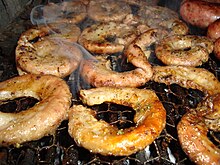Chunchullo
 Chunchulines being roasted using charcoal. | |
| Place of origin | Latin America |
|---|---|
| Region or state | North America and South America |
| Main ingredients | Pork, beef, or lamb small intestine |
Chinchulín is beef small intestine, which may be grilled or fried. It is consumed in many Latin American countries.
It is grilled over wood or charcoal. In Colombia, Argentina, Paraguay, Uruguay and Chile, however, it is usually roasted. Although it requires long cooking it is usually the first dish served in a Paraguayan, Uruguayan and Argentinian "asado".
They are presented in the form of a braid.
Names and characteristics according to country
Argentina, Uruguay, and Paraguay
Known as chinchulín and are typically roasted. The large intestine, in Argentina, is called "Tripa Gorda" (Big Gut) or torch and cooked similarly, except that they are usually washed inside and filled with the same filling for sausages.
Chile
Known as Chunchules.
Colombia
Depending on the region it can be called Chunchullo, Chunchulla, Chinchurria or Chunchurria. Usually eaten fresh.
Ecuador
In Ecuador it is known as tripa mishqui. It's roasted, and sometimes eaten with boiled potatoes or mote.
Venezuela
In Venezuela it is known as Chinchurria and is roasted.
Peru
In Peru this meal has a Creole term "choncholi" : prepared steamed and then roasted on a grill, food native of people from Angola, who were based in the south of the country to work in the cotton fields and sugar in the province of Ica, south of Lima. It was a typical food of the black population of Peru but now, like the kebabs they are consumed at every social level.
Mexico
In southern Mexico, the first portion of the small intestine of the cow (first 3–4 meters) is known as "tripa de leche" (translates to "gut of milk"). This is washed thoroughly with tap water, braided and boiled in a pressure cooker for about one hour, because it is very hard. Later, it's fried with garlic and onions and served on fresh tortillas, whole or chopped into cubes, served with hot salsa.
